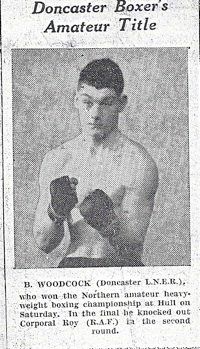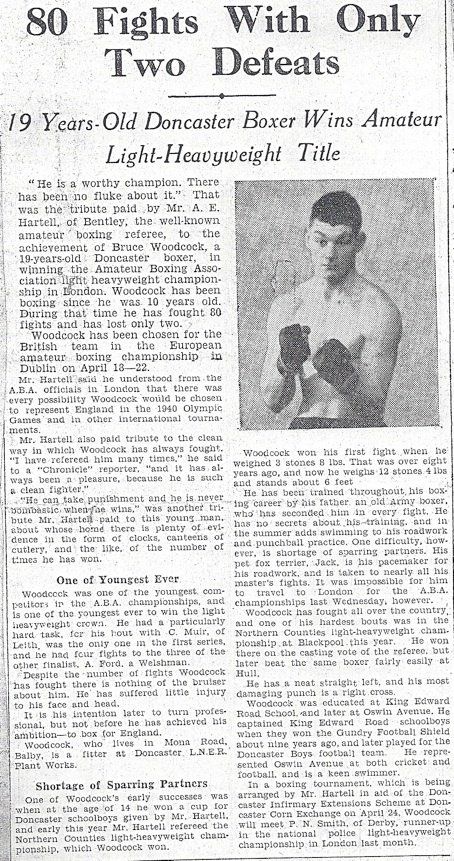Amateur : Early Years
Bruce’s amateur career started in earnest just one month after his 14th birthday: he appeared as an official representative of the L.N.E.R. Boxing Club at a tournament staged at the Doncaster Corn Exchange. On the bill he was listed as ‘Boy Woodcock, Schoolboy Champion of Doncaster, 1933’, and his opponent was Boy Allinson, schools champion of York. It was a four-round bout and Bruce won. It was the beginning of regular bouts for the L.N.E.R., moving up through light-weight, welter, middle and then cruiser as he developed and grew.
The L.N.E.R. annual tournament for 1937 was covered by the Yorkshire Evening News and included this account of Bruce’s fight against Gunner Dabbs of the York and Lancaster Regiment:
One of the best exhibitions of boxing was given by B.Woodcock, of the the L.N.E.R. team, who easily outpointed Gunner G. Dabbsof the 5th York and Lancaster Regiment boxing team, in a welter-weight contest of six rounds. Woodcock scored heavily throughout the fight with a fine straight left and showed some very clever footwork. [quoted in Two Fists and a Fortune]
For that fight, Bruce’s weight was 10st. 6lb. A year later, at the age of 18, he was a stone heavier and fighting as a middle and a light-heavyweight. It was this year, 1938, that he won his first really significant title, Northern Counties light-heavyweight champion. The contest took place in Blackpool at the Tower Circus. The luck of the draw meant Bruce went straight into the semi-final which he won. In the final he met up with J. Downs of Hull Kingston Boxing Club, the Northern Middle-weight champion of 1937. After a hard and thrilling second round, and a tough slog in the third, Bruce won the bout on the decision of the referee, Alfred Hartell of Bentley, a well-known amateur boxing referee and the man whose name was on the schoolboy cup that Bruce had won at the age of 12. The victory over Downs was confirmed a few weeks later in Downs’s home town of Hull when Bruce beat him again in a middle-weight contest put on by the Hull City Police.
Amateur : Progress and Success
The Northern Counties title meant Bruce could take part in the All England Amateur Boxing Association (A.B.A.) championships at the Royal Albert Hall in London on 29th March 1939, where he won the light heavyweight championship. It was a prestigious competition that Bruce played a big part in. At 19, he was one of the youngest competitors and this time he didn’t have an easy ride into the final. Instead he had to fight four bouts in one day, whereas the other finalists had three. With his father Sam as his second as usual, the first was a tough one against Scotsman Colin Muir from Leith. Having won that, Bruce was faced with Londoner Alf Harrington, the middle-weight champion three years previously, and beat him. The semi-final was against London policeman W. R. Goyder, a fine amateur who gave Bruce an action-packed fight, as did his opponent in the final, Welsh champion Alf Ford of the Derby Borough Police team. The contest went the full distance and Bruce won on points. He was the national amateur light heavyweight champion, and was immediately chosen for the British team in the European amateur boxing championship in Dublin later this same year.
Referee Alfred Hartell was glowing in his praise of Bruce as ‘a worthy champion’: he told a Chronicle reporter :.
- I have refereed him many times and it has always been a pleasure, because he is such a clean fighter. He can take punishment and he is never bombastic when he wins.
The Chronicle headline proclaims that, since starting out as a boxer, Bruce had had ‘80 fights with only two defeats’. This remarkable record and Bruce’s retiring, home-loving temperament were to remain with him throughout his career.
Amateur : European Controversy
The 1939 European amateur boxing championship took place on April 13th-22nd in Dublin, promoted by the Irish A.B.A. The competition was bedevilled by bad decisions by the judges and referees, with a number being reversed overnight. Bruce’s first bout featured one such episode.
He fought German Heinz Koppers and, after a hard bout and a low punch from Koppers, Bruce felt he had won, only to find the judges awarded victory to Koppers. The crowd created uproar, protesting loudly, and vehemently demanded the decision be reconsidered, and the A.B.A. officially protested. As a result, the Appeals Board reversed the verdict and Bruce went through, but only to find a similar problem in his second fight. He was up against the Polish fighter Franciszek Szymura, who went on to win the silver medal. After a bout that Bruce felt went all his way, the judges gave the decision to Szymura. The crowds again made it clear they didn’t agree but this time there was no change. Bruce had lost.
But like the rest of the team, Bruce was treated like a champion by the Irish organisers and attended receptions given by Dublin’s Lord Mayor and the Minister of Defence. It was a short respite before the other business of 1939 took over - the outbreak of war.
Bruce expected to be called up and was preparing himself for life as a P.T. instructor in the Army Physical Training Corps. But the war-time authorities designated railway fitters as necessary war workers and Bruce stayed on at the Plant Works.
Amateur : Amateur to Professional
His amateur career grew in strength as he did. His next major tournament was again in Ireland, but under very different circumstances, in 1940. He was part of the Northern Counties team, under the supervision of Alfred Hartell, who had been such a great encouragement to Bruce and many other amateur boxers. After a bad sea crossing, Bruce was the worse for wear from sea-sickness, but he still went on to make sure there was no doubt about it this time: he beat the Connacht cruiser-weight champion, Conmey, knocking him down twice before the referee stopped the fight in the second round.
The speed and power with which he took the victory were to become trade-marks of his professional career. And that career was beginning to beckon ! Top class amateur though he was, Bruce was still earning the meagre wages of a railway fitter, £1 per week; and grateful as he had been for the job and the opportunities the L.N.E.R. amateur team had given him, he was ambitious for other things, not least the financial security to take his family out of Carr Hill. And there was another factor: the war meant all the amateur championships were suspended, so he couldn’t even maintain his status by defending his A.B.A. title.
Bruce had moved to Manchester to work as a maintenance engineer in a shell-making plant at Dukinfield, under war-time redeployment measures. The big problem was there was no gym at the plant, and he couldn’t find anything that would do in Hyde where he was staying, even a barn. Out of this uncertainty came the chance he was looking for. He went to a boxing show at the Belle Vue stadium, a venue he would later become very familiar with as the scene of some of his great fights. He asked around on the off-chance that someone might be able to help him to find a gym. Instead, they found him a career. The announcer, Tom Spedding, gave him a name - Tom Hurst - and it was Tom Hurst who encouraged Bruce to turn professional and became his manager.


